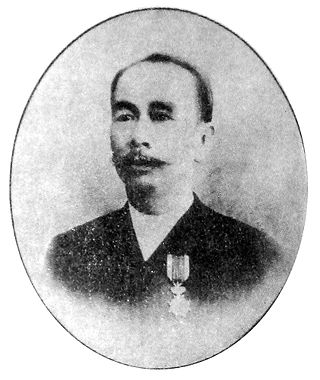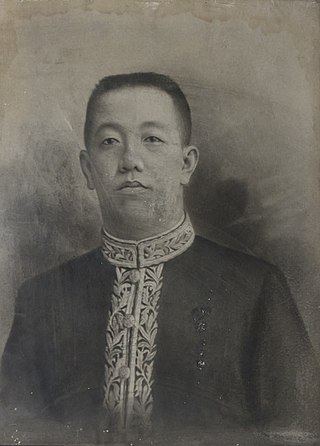
Benteng people are a Chinese Indonesian community of 'Peranakan' or mixed descent, native to the historic Tangerang area in the modern-day Indonesian provinces of Jakarta, Banten and West Java.

Phoa Keng Hek Sia was a Chinese Indonesian Landheer (landlord), social activist and founding president of Tiong Hoa Hwe Koan, an influential Confucian educational and social organisation meant to better the position of ethnic Chinese in the Dutch East Indies. He was also one of the founders of Institut Teknologi Bandung.
Tjerita Sie Po Giok, atawa Peroentoengannja Satoe Anak Piatoe is a 1911 children's novel from the Dutch East Indies written by Tio Ie Soei in vernacular Malay. It tells the story of Sie Po Giok, a young orphan who faces several challenges while living with his uncle in Batavia. The story, which has been called the only work of children's literature produced by Chinese Malay writers, has been read as promoting traditional gender roles and questioning Chinese identity.
Thio Tjin Boen was a Chinese-Indonesian writer of Malay-language fiction and a journalist.
Tjerita "Oeij-se": Jaitoe Satoe Tjerita jang Amat Endah dan Loetjoe, jang Betoel Soedah Kedjadian di Djawa Tengah is a 1903 Malay-language novel by the ethnic Chinese writer Thio Tjin Boen. It details the rise of a Chinese businessman who becomes rich after finding a kite made of paper money in a village, who then uses dishonesty to advance his personal wealth before disowning his daughter after she converts to Islam and marries a Javanese man.

Khouw Kim An, 5th Majoor der Chinezen was a high-ranking Chinese Indonesian bureaucrat, public figure and landlord who served as the fifth and last Majoor der Chinezen of Batavia, Dutch East Indies. The Chinese Mayoralty was the highest-ranking, Chinese government position in the East Indies with considerable political and judicial jurisdiction over the colony's Chinese subjects. The Batavian Mayoralty was one of the oldest public institutions in the Dutch colonial empire, perhaps second only in antiquity to the viceregal post of Governor-General of the Dutch East Indies.
Khouw Oen Giok Sia, later more popularly known as Oen Giok Khouw or O. G. Khouw, was a philanthropist and landowner in the Dutch East Indies. He gained notoriety for acquiring Dutch citizenship, thus breaking down the race barriers of colonial society. Today, he is best remembered for his extravagant mausoleum in Petamburan, Jakarta.

Tan Eng Goan, 1st Majoor der Chinezen was a high-ranking bureaucrat who served as the first Majoor der Chinezen of Batavia, capital of colonial Indonesia. This was the highest-ranking Chinese position in the civil administration of the Dutch East Indies.

Oey Tamba Sia, also spelt Oeij Tambah Sia, or often mistakenly Oey Tambahsia, was a rich, Chinese-Indonesian playboy hanged by the Dutch colonial government due to his involvement in a number of murder cases in Batavia, now Jakarta, capital of colonial Indonesia. His life has become part of Jakarta folklore, and inspired numerous literary works.

Sia was a hereditary, noble title of Chinese origin, used mostly in colonial Indonesia. It was borne by the descendants of Chinese officers, who were high-ranking, Chinese civil bureaucrats in the Dutch colonial government, bearing the ranks of Majoor, Kapitein or Luitenant der Chinezen.
Khouw Tjeng Kee, Luitenant-titulair der Chinezen was a Chinese-Indonesian magnate and landlord in Batavia, capital of the Dutch East Indies.
Phoa Beng Gan, Kapitein der Chinezen, also called Bingam or Phoa Bing Gam in some early sources, was a Chinese-Indonesian bureaucrat and engineer, best known for his irrigation work in Batavia. He served as the third Kapitein der Chinezen of Batavia from 1645 to 1663, succeeding Kapitein Lim Lak Ko.

Tan Tjoen Tiat, 2nd Majoor der Chinezen was a Chinese-Indonesian bureaucrat who served as the second Majoor der Chinezen, or Chinese headman, of Batavia, now Jakarta, capital of Indonesia. This was the most senior Chinese position in the colonial civil bureaucracy of the Dutch East Indies. As Majoor, Tan was also the Chairman of the Chinese Council of Batavia, the city's highest Chinese government body.
Lim Soe Keng Sia, also known as Liem Soe King Sia, Soe King Sia or Lim Soukeng Sia, was a Pachter, or revenue farmer, in Batavia, capital of the Dutch East Indies, best known for his rivalry with the notorious Betawi playboy Oey Tamba Sia. He acted as administrator of the 'Ngo Ho Tjiang' Kongsi, the most influential consortium of opium monopolists in early to mid-19th century Batavia.
Tan Tjin Kie, Majoor-titulair der Chinezen was a high-ranking bureaucrat, courtier, sugar baron and head of the prominent Tan family of Cirebon, part of the ‘Cabang Atas’ or Chinese gentry of the Dutch East Indies. He is best remembered today for his lavish, 40-day-long funeral ceremony of 1919, reputedly the most expensive ever held in Java.

Oey Djie San, Kapitein der Chinezen was a Chinese-Indonesian public figure, bureaucrat and landlord, best known for his role as Landheer of Karawatji and Kapitein der Chinezen of Tangerang. In the latter capacity, he headed the local Chinese civil administration in Tangerang as part of the Dutch colonial system of 'indirect rule'.

Oey Giok Koen, Kapitein der Chinezen was a Chinese-Indonesian public figure, bureaucrat and Landheer, best known for his role as Kapitein der Chinezen of Tangerang and Meester Cornelis, and as one of the richest landowners in the Dutch East Indies. As Kapitein, he headed the local Chinese civil administration in Tangerang and Meester Cornelis as part of the Dutch colonial system of 'indirect rule'. In 1893, he bought the particuliere landen or private domains of Tigaraksa and Pondok Kosambi.
Oey Liauw Kong, Kapitein der Chinezen (1799–1865) was a Chinese-Indonesian high official, Landheer (landlord) and head of the Oey family of Kemiri, part of the 'Tjabang Atas' or Peranakan gentry. He was also the owner of the 18th-century Baroque mansion and Jakarta landmark, Toko Merah.









